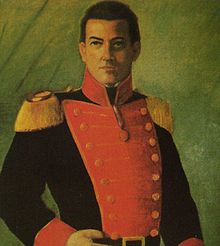José Gregorio Monagas
José Gregorio Monagas | |
|---|---|
 | |
| 12th President of Venezuela | |
| In office February 5, 1851 – January 20, 1855 | |
| Preceded by | José Tadeo Monagas |
| Succeeded by | José Tadeo Monagas |
| Personal details | |
| Born | May 4, 1795 Aragua de Barcelona, Venezuela |
| Died | July 15, 1858 Maracaibo, Venezuela |
| Spouse | Clara Marrero |
| Signature | |
José Gregorio Monagas (May 4, 1795 - July 15, 1858) was President of Venezuela 1851-1855 and brother of José Tadeo Monagas.
General José Gregorio Monagas was born in Aragua de Barcelona, Venezuela, in 1795. He started his military career very early in 1813, along with his brother José Tadeo. Militar career During the Venezuela's emancipation war, Monagas participated in several important campaigns against Spanish royalists Juan de Monteverde and José Tomás Boves. Because of his brave participation in the Battle of Carabobo, Simón Bolívar dubbed him the first lance of the East.
He maintained with the arms the government of his brother José Tadeo, who as a result of the 1848 events originated a serious opposition, very specially the one of José Antonio Páez. When José Tadeo Monagas finalized his constitutional period, José Gregorio Monagas succeeded his brother as President of Venezuela in 1851. During his presidency, Monagas proclaimed Venezuela to be a nation free of slavery, in an edict signed on March 24, 1854. In 1855, José Gregorio Monagas was succeeded by his brother José Tadeo in the presidency of Venezuela again.
José Gregorio Monagas and his brother José Tadeo Monagas combined rule 1847-1858 is commonly referred to as the Monagas Dynasty, or Monagato.
In 1858, Monagas is captured in Barcelona by general Justo Briceño. He is then sent to the castle of San Carlos, Zulia. In July, Zulia's governor José Serrano ordered him to be transferred to Maracaibo, where he died upon arrival on July 15, 1858.

